
Maintaining pool requires careful attention to detail and a comprehensive understanding of the chemical balance that keeps your swimming space clear, clean, and safe.
As a pool service company, we are committed to empowering pool owners like yourself with the information required to ensure the longevity and optimum health of your pool.
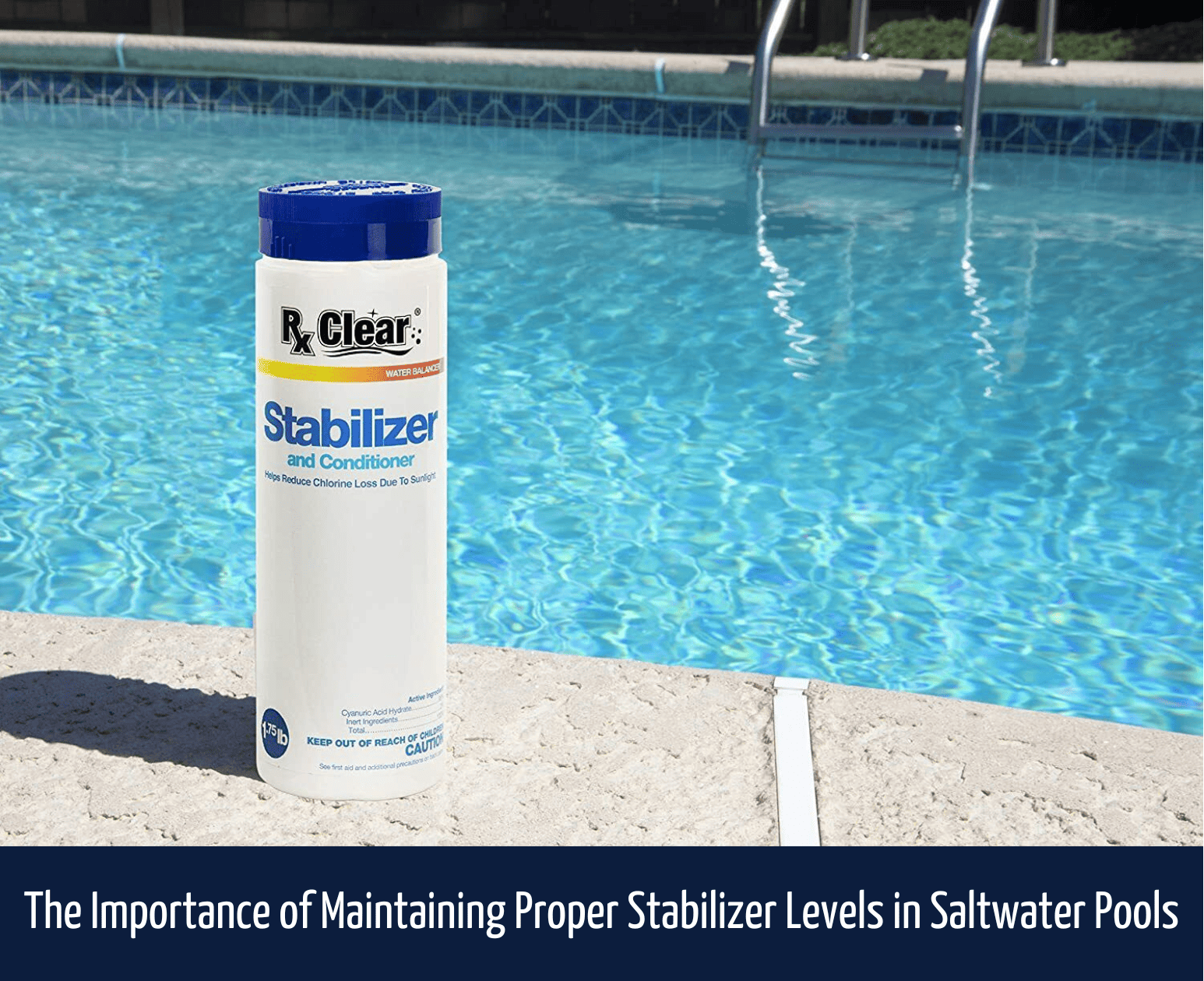
A very important aspect of pool maintenance is proper chemical balance of your pool water. Ensuring clear water, avoiding algae buildup, and maintaining proper pH levels are undoubtedly crucial tasks.
However, less talked about but equally important is the role of stabilizer, or cyanuric acid, especially in saltwater pools.
In this post, we will dive into the importance of maintaining appropriate stabilizer levels in your saltwater pool.
We’ll explain what stabilizer is and its crucial role in protecting the effectiveness of your chlorine.
We will also draw distinctions between saltwater pools and traditional chlorine pools, highlighting the unique challenges and benefits of saltwater systems.
We will also guide you step-by-step on how to add stabilizer to your saltwater pool, beginning with testing the water and determining current stabilizer levels and discuss potential consequences of incorrect stabilizer levels, detailing how it impacts on your pool’s health and ultimately, your swimming experience.
So, without further ado, let’s dive in.
Stabilizer is a term that’s talk about quite frequently in the world of pool maintenance. Also known as cyanuric acid, stabilizer plays a crucial role in maintaining overall health and cleanliness of your pool.
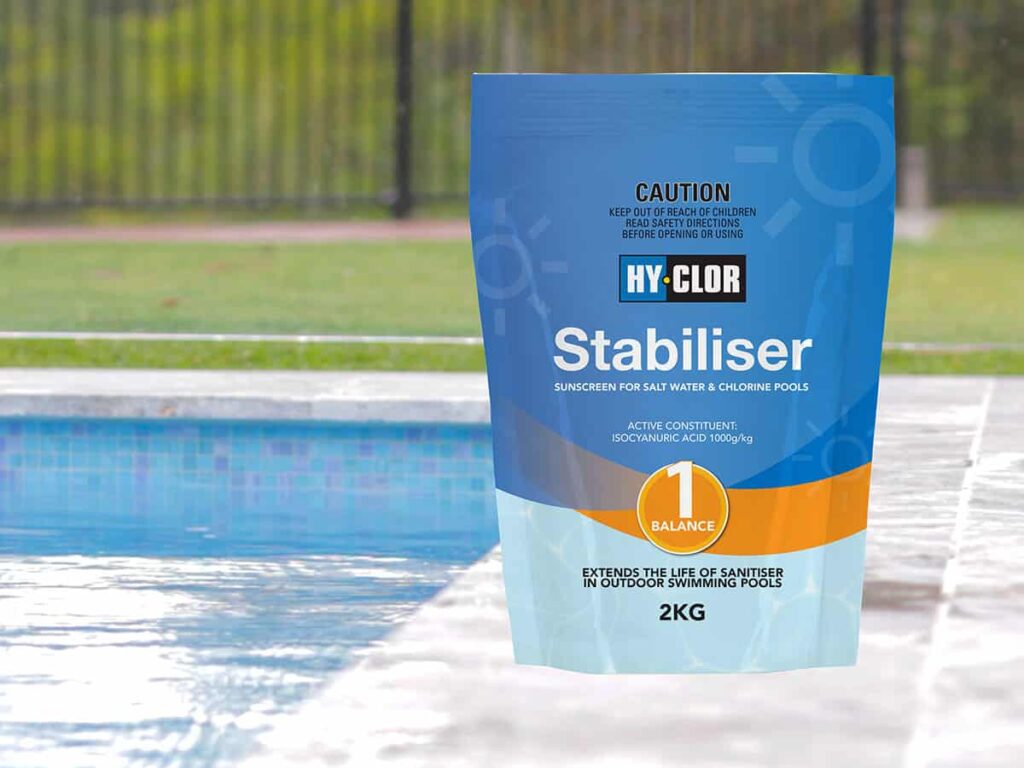
But what exactly is it, and why is it so important?
Cyanuric acid, or stabilizer, is a type of chemical compound that interacts directly with chlorine in your pool to help maintain its effectiveness.
Think of stabilizer as a bodyguard for chlorine.
Chlorine, while incredibly effective at killing bacteria and other harmful contaminants, is unfortunately highly susceptible to degradation from sunlight.
That’s where stabilizer comes in.
As its name implies, a stabilizer’s primary function is to ‘stabilize’ the chlorine in your pool. It does this by forming a protective shield around the chlorine molecules, safeguarding them from sun’s ultraviolet (UV) rays.
UV radiation is particularly destructive to chlorine, breaking it down and rendering it ineffective in a surprisingly short amount of time.
With a stabilizer, however, this degradation process is significantly slowed.
To put it simply, cyanuric acid or stabilizer increases the lifespan of chlorine in your pool, making it more efficient and cost-effective.
Without the stabilizer, you would need to add chlorine much more frequently to ensure a sanitized and safe swimming environment.
There some key differences between saltwater and traditional chlorine pools, and understanding the differences is crucial for proper pool maintenance.
A traditional chlorine pool involves adding chlorine directly to the water, whereas a saltwater pool uses a salt chlorine generator.
This generator breaks down salt into chlorine. This chlorine then goes to work sanitizing the pool before being converted back into salt, and the process starts over. This cycle results in a steady, automated production of chlorine, reducing the need for pool owners to manually ad chlorine frequently.
However, despite this automated chlorine production, it’s important to remember that the chlorine levels in a saltwater pool are generally lower compared to traditional chlorine pools.
This reduced chlorine concentration, while often making the water feel softer and more comfortable for swimmers, can make the pool more susceptible to contaminants if not properly managed.
This is why the role of a stabilizer becomes vital. The lower chlorine levels mean that the chlorine can be depleted more quickly by UV radiation, risking an under-sanitized pool.
The stabilizer, or cyanuric acid, helps to shield this chlorine from the sun’s rays, ensuring that it lasts longer and can effectively sanitize the pool.
Even though, saltwater pools generate their own chlorine, they still benefit greatly from the protective effect of a stabilizer. By safeguarding the chlorine, the stabilizer ensures that your saltwater pool remains as clean and healthy as possible.
Now that we’ve understood the importance of stabilizers, or cyanuric acid, in your saltwater pool, let’s look at how you can add it to maintain appropriate levels.
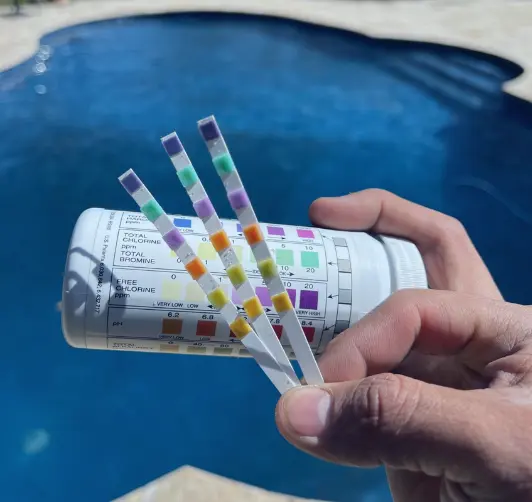
The first and foremost step is to test the pool water. This helps determine the current levels of various chemicals, including stabilizer, in your pool.
A good quality test kit is a worthwhile investment for any pool owner. Ensure that the test kit you choose is capable of measuring cyanuric acid levels.
But you don’t necessarily need a high quality test to kit to get fairly accurate results. There are many test strip manufacturers out there – we like the AquaChek brand – just make sure you choose test strips that test for CYA.
After testing the pool water, you should have a clear understanding of your pool’s current stabilizer levels. It’s generally recommended to maintain cyanuric acid levels between 30 to 50 parts per million (ppm) in a saltwater pool.
If your levels are lower than this, you’ll need to add stabilizer. If they’re higher, you might need to dilute your pool water to bring them down.
Many pool owners are familiar with the practice of adding chlorine tabs to their pools. Some of these tabs come with a stabilizer included.
This can be an easy way to boost both your chlorine and stabilizer levels at the same time. However, it’s important to note that not all chlorine tabs contain stabilizer, so be sure to read the product details carefully.
If your pool requires a stabilizer, here’s a step-by-step guide on how to add it:
Having too much or too little of a chemical, can have significant consequences. One such chemical is the stabilizer or cyanuric acid.
Let’s explore the potential problems that can arise from insufficient stabilizer levels.
As we’ve discussed earlier, one of the primary roles of a stabilizer is to protect the chlorine in your pool from being broken down by the sun’s UV rays.
When stabilizer levels are low, chlorine is left vulnerable to rapid degradation. This leads to an ineffective sanitization process as chlorine cannot stay in the water long enough to kill bacteria, viruses, and other harmful microorganisms.
Insufficient stabilizer levels can have a cascading effect on your pool’s health. With chlorine being quickly broken down due to a lack of protection from stabilizer, your pool becomes more susceptible to algae growth and bacterial contamination.
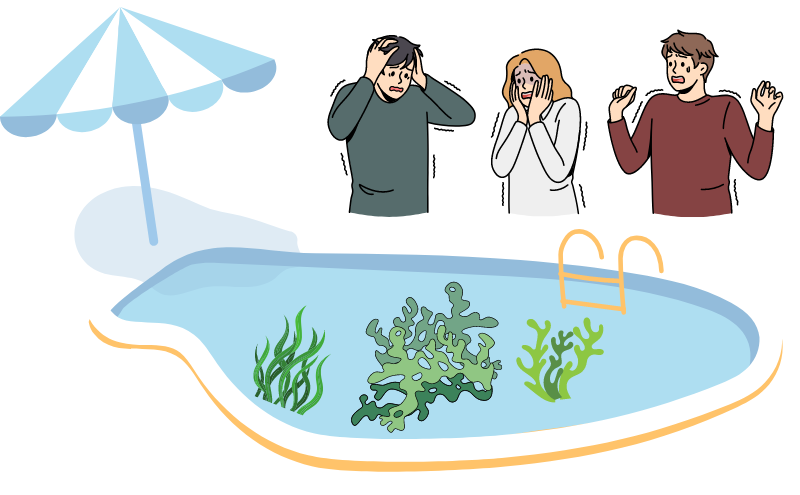
Algae can quickly make your pool water green and murky, while bacteria pose a risk to the health and safety of swimmers.
The risks aren’t just limited to your pool’s cleanliness. Low stabilizer levels, resulting in ineffective sanitization, can expose swimmers to harmful bacteria and viruses that can lead to a variety of health problems.
Eye, ear, and skin infections are among the most common issues swimmers can experience when exposed to poorly sanitized water.
Just as having insufficient levels of stabilizer in your pool can create issues, so too can having an excess of it. Overloading your pool with stabilizer can lead to a range of problems. Let’s discuss a few of these.
One of the most common problems caused by excessive stabilizer levels is what’s known as “chlorine lock.”
This occurs when high cyanuric acid levels make the chlorine in your pool less effective. The stabilizer blinds to the chlorine, preventing it from sanitizing the water properly.
This means that even if you have ample chlorine in your pool, it may not be able to do its job of keeping your pool clean and safe.
Excessive stabilizer levels can also cause your pool water to become cloudy. This is because high levels of stabilizer alter the balance of your pool chemistry, affecting the clarity of your water.
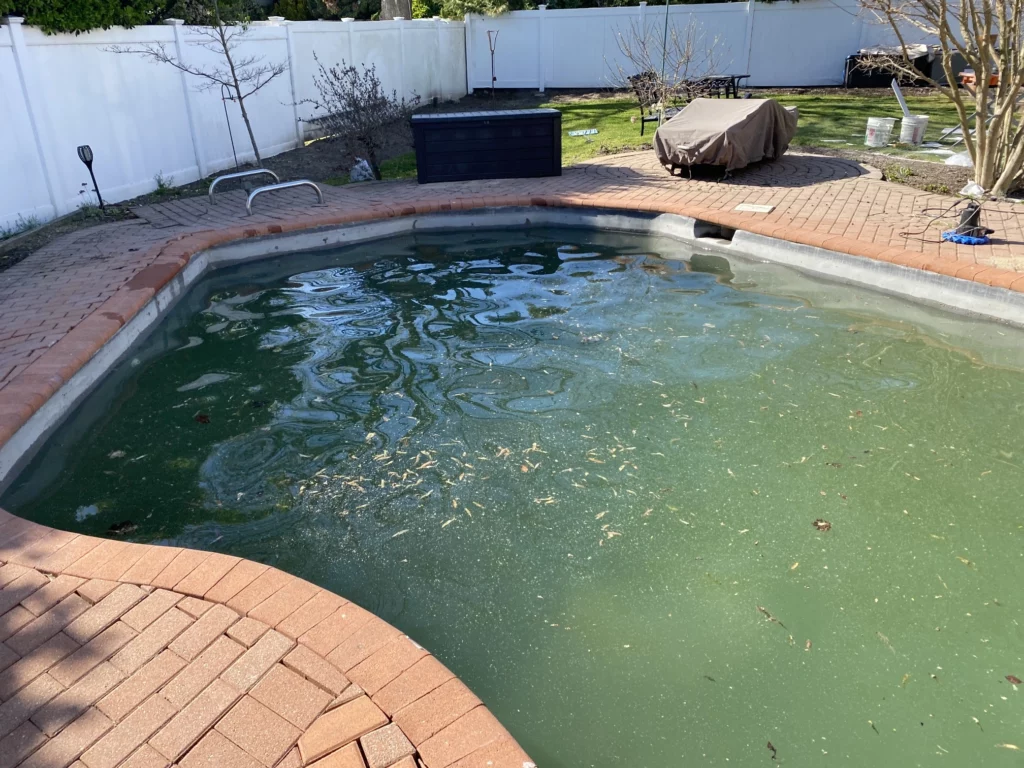
Furthermore, high stabilizer levels can make it more difficult to maintain the right chlorine levels. You may find that you’re using more and more chlorine to try and achieve the right balance, only to find that your water remains cloudy and unsanitary.
In cases where the stabilizer level becomes excessively high, more drastic measures may be needed to rebalance your pool.
This often involves partially or fully draining and refilling your pool to lower the stabilizer concentration, a process that can be time-consuming and costly.
It’s essential to remember that prevention is better than cure. Regularly testing your pool water and carefully adding chemicals, including stabilizer, will help to prevent these issues.
Keeping an eye on your stabilizer level is just as crucial as watching your pool’s pH and chlorine levels.
At the heart of maintaining a clean, safe, and enjoyable swimming pool is the regular checking of water chemistry.
The importance of this cannot be overstated. Regular testing and adjusting of your pool’s chemical levels, including the stabilizer, is a vital task that safeguards not only the quality of your pool water but also the health and well-being of those who use it.
However, we understanding that pool chemistry can sometimes feel overwhelming, particularly if you’re new to pool ownership or have a busy schedule. That’s why we suggest you to book a chemical service call.
Our pool service technicians are trained in the proper application of liquid stabilizer, ensuring accurate dosage and effective results. We prioritize the use of liquid stabilizer due to its ease of use and fast dissolving properties, which contribute to maintaining optimal stabilizer levels in your pool.
Here’s a video of one of our skilled technicians using and adding liquid stabilizer to a client’s pool.
We appreciate your trust in our services and your commitment to pool maintenance and safety. By utilizing liquid stabilizer and partnering with our knowledgeable team, you can ensure that your saltwater pool remains clean, balanced, and enjoyable for all.
We hope this blog post helped you learn the role of stabilizer in your pool, the specific importance of stabilizer in saltwater pools, and the recommended levels for optimal pool chemistry.
It is crucial to understand the consequences of incorrect stabilizer levels, such as inadequate sanitation or chlorine lock.
If you have any questions or queries related to stabilizer or anything pool-related, then don’t hesitate to get in touch with us, we will be more than happy to guide you in your pool maintenance journey.

We make pool ownership easy with stress-free maintenance, expert repairs, and cutting-edge tech. From sparkling water to pool automation, we handle every detail so you can relax and enjoy your pool.
© 2025 Paul Romanelli & Son Pool Service.